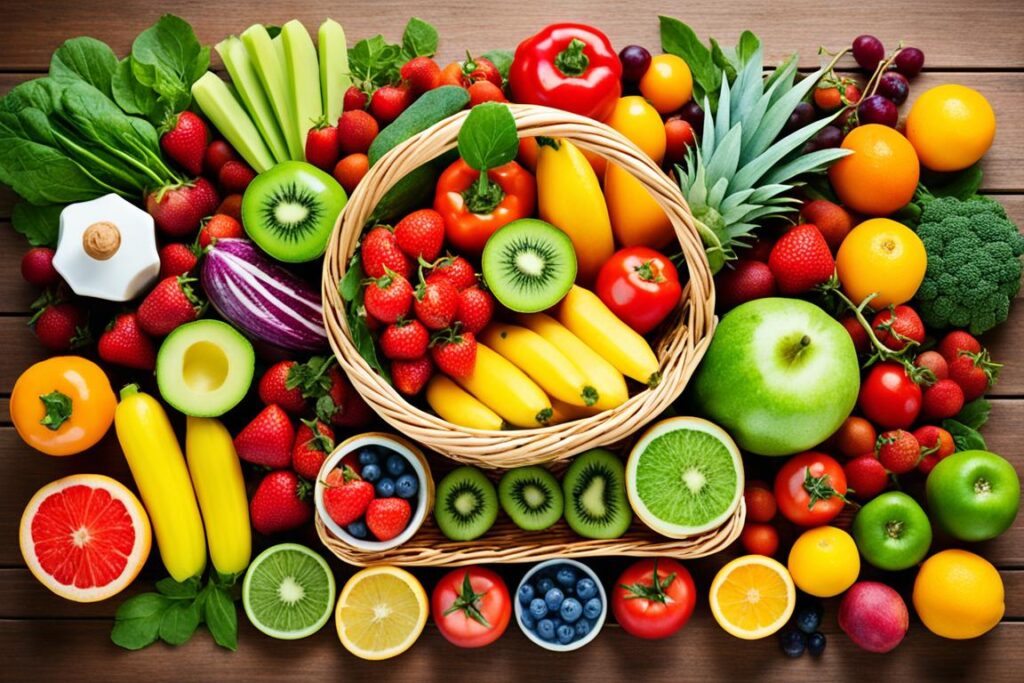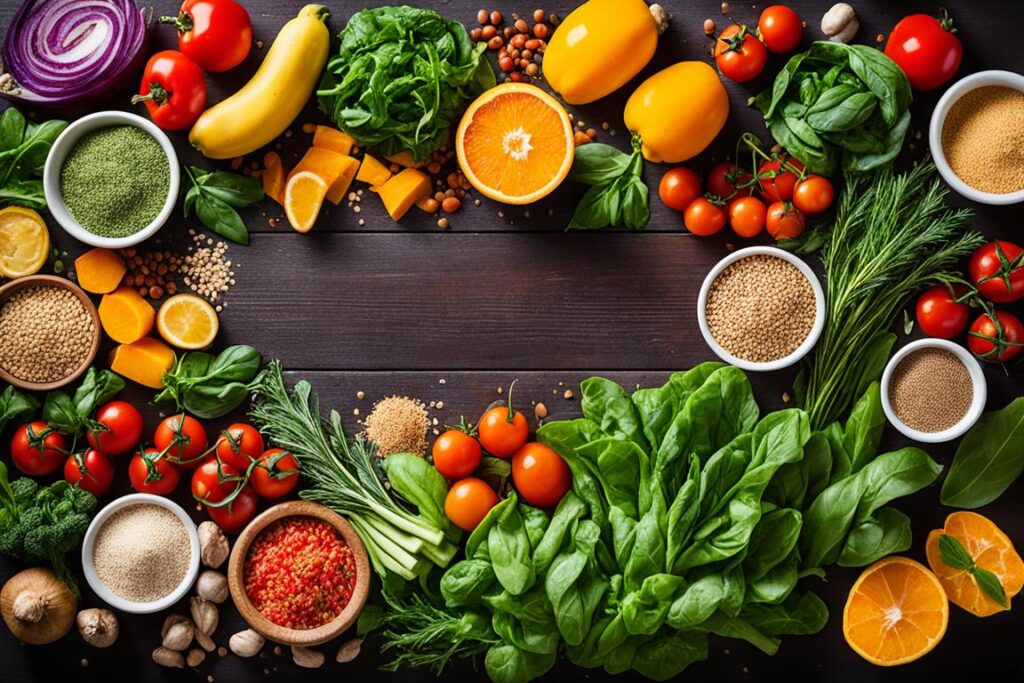Eating a wide variety of nutritious foods is essential for maintaining optimal health and wellness. Incorporating fruits, vegetables, nuts, seeds, and lean protein into your daily diet can provide your body with the essential vitamins and minerals it needs to thrive. Here, we will explore some of the best health foods and vitamins to include in your daily routine that can help you achieve overall wellness.
Key Takeaways:
- Include a diverse range of nutritious foods in your diet
- Fruits, vegetables, nuts, seeds, and lean protein are excellent choices
- Essential vitamins and minerals are beneficial for your body
- Optimal nutrition supports overall health and wellness
- Achieve wellness by incorporating these foods into your daily routine
Importance of Nutrition for a Strong Immune System
Your immune system is your body’s defense against infections and illnesses. It acts as a shield, protecting you from harmful pathogens. One of the key factors in maintaining a strong immune system is proper nutrition. A well-nourished body with the right vitamins and nutrients can help boost immune function and keep you healthy.
When it comes to immune boosting, superfoods are your secret weapon. These nutrient-dense foods are packed with vitamins, minerals, and antioxidants that help support a healthy immune system. Incorporating superfoods into your diet can provide a natural way to enhance your body’s defenses.
Superfoods for Immune Health
Include these superfoods in your daily meals to give your immune system a boost:
- Kale: This leafy green powerhouse is rich in vitamin C, which is known to stimulate the production of immune cells. Add kale to your salads or smoothies for a nutritious immune boost.
- Berries: Blueberries, strawberries, and raspberries are packed with antioxidants that help fight off harmful free radicals in the body. Enjoy them as a snack or add them to your morning oatmeal.
- Ginger: Known for its anti-inflammatory properties, ginger can help reduce inflammation in the body, supporting a healthy immune response. Add fresh ginger to your soups, stir-fries, or teas for an immune-boosting kick.
- Turmeric: This vibrant yellow spice contains curcumin, which has powerful anti-inflammatory and antioxidant effects. Sprinkle turmeric on roasted vegetables or incorporate it into your curry dishes.
- Garlic: Garlic is not just a flavorful ingredient; it also has immune-boosting properties. It contains sulfur compounds that stimulate immune cells and help fight off infections. Add fresh garlic to your pasta sauces, stir-fries, or roasted vegetables.
While superfoods are beneficial for immune health, it’s important to maintain a well-rounded plant-based diet that includes a variety of fruits, vegetables, whole grains, legumes, and lean proteins. Eating a diverse range of nutrient-dense foods ensures that you get a wide array of vitamins and minerals to support your immune system.
Remember, a healthy lifestyle goes hand in hand with a strong immune system. In addition to a nutritious diet, make sure to prioritize regular exercise, adequate sleep, stress management, and good hygiene practices.
| Superfoods for Immune Health | Benefits |
|---|---|
| Kale from Amazon | Rich in vitamin C to stimulate immune cell production |
| Berries from Berries Unlimited | Packed with antioxidants to fight off harmful free radicals |
| Ginger from Alstede Farms | Anti-inflammatory properties to support a healthy immune response |
| Turmeric from earthwebshop | Contains curcumin for its anti-inflammatory and antioxidant effects |
| Garlic from Keene Garlics | Stimulates immune cells and helps fight off infections |
The Link Between Nutrition and Mental Well-being
Research has shown that our dietary choices can have a significant impact on our mental health and overall well-being. It’s not just about fueling our bodies; it’s also about nourishing our minds. Certain foods have been identified as mood-boosting powerhouses that can increase serotonin levels in the brain, commonly referred to as the “happy hormone.”
One such example is dark chocolate, which contains antioxidants and compounds that can stimulate the production of serotonin and enhance feelings of happiness. Additionally, consuming omega-3 fatty acids found in fatty fish like salmon and sardines has been linked to lower rates of depression and improved cognitive function.
Furthermore, studies indicate that consuming foods rich in probiotics, such as yogurt and sauerkraut, can have a positive impact on mental health by improving gut health. The gut-brain connection plays a crucial role in regulating emotions and neurotransmitters, ultimately influencing our mood and well-being.
So, if you’re looking to boost your mental well-being, incorporating mood-boosting foods into your diet is a step in the right direction. Prioritizing whole foods, such as fruits, vegetables, whole grains, and lean proteins, can provide the nutrients necessary for a healthy brain and a happier you.



